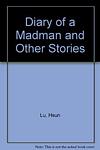Xun Lu
Xun Lu (1881–1936) was a leading figure of modern Chinese literature. Writing in the early 20th century, a time of significant political and social upheaval in China, Lu Xun was a prolific writer of essays, short stories, and novels. He is best known for his short story collections 'Call to Arms' (1923) and 'Wandering' (1926), and is considered a key player in the New Culture Movement that sought to modernize Chinese culture and promote literary vernacular writing. His works are highly regarded for their insight into the human condition and criticism of the social ills of his time.
Books
This list of books are ONLY the books that have been ranked on the lists that are aggregated on this site. This is not a comprehensive list of all books by this author.
-
1. Diary of a Madman and Other Stories
"Diary of a Madman and Other Stories" is a collection of short stories that explore the social issues and struggles of early 20th century China. The stories revolve around themes of poverty, mental illness, and societal pressures. The title story, written in the first-person perspective, is a harrowing tale of a man descending into madness, believing that everyone around him is part of a cannibalistic conspiracy. These stories provide a vivid depiction of the human condition and the harsh realities of life during this period in Chinese history.
-
2. Selected Stories of Lu Hsun
"Selected Stories of Lu Hsun" is a collection of short stories that provides a critical look at traditional Chinese society and culture. The author uses satire and irony to highlight the struggles and injustices faced by the common people, often focusing on themes such as education, poverty, and the oppressive nature of the ruling class. The stories are also notable for their exploration of the human condition and the complexities of individual morality.
-
3. The True Story Of Ah Q
The book is a satirical novella that follows the misadventures of Ah Q, a delusional and arrogant peasant who consistently rationalizes his defeats as spiritual victories. Set against the backdrop of the early 20th-century Chinese society, the story critiques the cultural and social issues of the time, including class struggle, the fall of the Qing Dynasty, and the rise of revolutionary sentiment. Ah Q is emblematic of the flaws in national character and the story's tragicomic tone serves to underscore the futility of his delusions and the broader societal failures.


